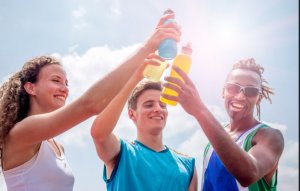How Electrolytes in Athletes Work

Electrolytes are important mineral salts for athletes. They help physiological reactions and metabolic processes. In addition, electrolytes in athletes play an important role within the water and osmotic balance. There are different minerals that work as electrolytes. For example, sodium, potassium, calcium, and magnesium.
In this article, we’ll show you how they work in athletes. In addition, we’ll tell you why you need to make sure you get enough of them, especially in long term events.
Sodium
This mineral actively helps the nervous system send messages. Also, it regulates blood pressure and cell homeostasis. Losing it through sweat and urine can cause hyponatremia. In fact, it can be fatal.
Low levels of this mineral can cause dizziness in athletes. Also, it can promote hydration, since it helps with thirst. For this reason, sodium deficiency can negatively influence sports performance. You can find this in the journal Anesthesiology, Intensivmedizin, Notfallmedizin; Schmerztherapie: AINS.
Also, losing sodium during exercise can cause muscle fatigue and changes in heart rhythm, according to a study published in 2015.
Electrolytes in athletes: magnesium
Magnesium deficiency is mainly associated with the appearance of muscle cramps, which can be bad for athletes’ performance. In addition, it helps with energy metabolism at the mitochondrial level and protein synthesis.

As a general rule, you usually don’t need supplements of this mineral, as long as you follow a balanced diet, and don’t lose too much sweat or urine. However, adding extra magnesium to your drink before a competition can minimize the risk of cramping.
Calcium
This mineral is the most abundant in the body, and actively participates in bone metabolism. In addition, it helps the nervous system send messages.
Vitamin D helps absorb calcium. Losing calcium through sweat can lead to the need to replace it during a long endurance competition.
However, we don’t recommend regularly taking calcium supplements, beyond taking it with sports drinks.
Potassium
Potassium in sports drinks mainly helps store glycogen and balances oxygen.
For this reason, consuming foods with sugars and potassium, such as bananas, is recommended during sports. They have both nutrients, which guarantees the replacement of muscle glycogen.
Electrolytes in athletes: where to find them
You can meet the need for electrolytes in athletes with commercial sports isotonic drinks. These types of products usually provide the necessary amounts of each of these mineral salts that your body needs to carry out its processes.
Some of these drinks are enriched with sugars or buffer substances with beta-alanine or sodium bicarbonate. There are also products on the market that have caffeine to improve performance.
On the other hand, you can buy mineral salt pills and dissolve them in a cup of water before the event. Through daily food, you can make sure you consume enough.

However, keep in mind that during endurance sports, you might need to alter these needs. This is because you lose some of these minerals through sweat.
Don’t neglect electrolytes in athletes
Just as hydration is important during sports, electrolytes in athletes is also important to prevent fatigue or other major problems.
To make sure you get enough mineral salts, make sure you follow a balanced and varied diet. Also, it’s a good idea to use isotonic drinks during resistance exercise to compensate for losses through sweating.
Remember, once the training or competition is over, it’s important to replace the nutrients that your body has lost or used. For this, you need a complete post-exercise meal, containing vegetables and enough protein.
Electrolytes are important mineral salts for athletes. They help physiological reactions and metabolic processes. In addition, electrolytes in athletes play an important role within the water and osmotic balance. There are different minerals that work as electrolytes. For example, sodium, potassium, calcium, and magnesium.
In this article, we’ll show you how they work in athletes. In addition, we’ll tell you why you need to make sure you get enough of them, especially in long term events.
Sodium
This mineral actively helps the nervous system send messages. Also, it regulates blood pressure and cell homeostasis. Losing it through sweat and urine can cause hyponatremia. In fact, it can be fatal.
Low levels of this mineral can cause dizziness in athletes. Also, it can promote hydration, since it helps with thirst. For this reason, sodium deficiency can negatively influence sports performance. You can find this in the journal Anesthesiology, Intensivmedizin, Notfallmedizin; Schmerztherapie: AINS.
Also, losing sodium during exercise can cause muscle fatigue and changes in heart rhythm, according to a study published in 2015.
Electrolytes in athletes: magnesium
Magnesium deficiency is mainly associated with the appearance of muscle cramps, which can be bad for athletes’ performance. In addition, it helps with energy metabolism at the mitochondrial level and protein synthesis.

As a general rule, you usually don’t need supplements of this mineral, as long as you follow a balanced diet, and don’t lose too much sweat or urine. However, adding extra magnesium to your drink before a competition can minimize the risk of cramping.
Calcium
This mineral is the most abundant in the body, and actively participates in bone metabolism. In addition, it helps the nervous system send messages.
Vitamin D helps absorb calcium. Losing calcium through sweat can lead to the need to replace it during a long endurance competition.
However, we don’t recommend regularly taking calcium supplements, beyond taking it with sports drinks.
Potassium
Potassium in sports drinks mainly helps store glycogen and balances oxygen.
For this reason, consuming foods with sugars and potassium, such as bananas, is recommended during sports. They have both nutrients, which guarantees the replacement of muscle glycogen.
Electrolytes in athletes: where to find them
You can meet the need for electrolytes in athletes with commercial sports isotonic drinks. These types of products usually provide the necessary amounts of each of these mineral salts that your body needs to carry out its processes.
Some of these drinks are enriched with sugars or buffer substances with beta-alanine or sodium bicarbonate. There are also products on the market that have caffeine to improve performance.
On the other hand, you can buy mineral salt pills and dissolve them in a cup of water before the event. Through daily food, you can make sure you consume enough.

However, keep in mind that during endurance sports, you might need to alter these needs. This is because you lose some of these minerals through sweat.
Don’t neglect electrolytes in athletes
Just as hydration is important during sports, electrolytes in athletes is also important to prevent fatigue or other major problems.
To make sure you get enough mineral salts, make sure you follow a balanced and varied diet. Also, it’s a good idea to use isotonic drinks during resistance exercise to compensate for losses through sweating.
Remember, once the training or competition is over, it’s important to replace the nutrients that your body has lost or used. For this, you need a complete post-exercise meal, containing vegetables and enough protein.
All cited sources were thoroughly reviewed by our team to ensure their quality, reliability, currency, and validity. The bibliography of this article was considered reliable and of academic or scientific accuracy.
- Dresely F., Disturbances of sodium homeostasis. Anasthesiol Intesnivmed Notfallmed Schmerzther, 2018. 53 (7-8): 492-502.
- Volpe SL., Magnesium and athlete. Curr Sports Med Rep, 2015. 14 (4): 279-83.
This text is provided for informational purposes only and does not replace consultation with a professional. If in doubt, consult your specialist.








